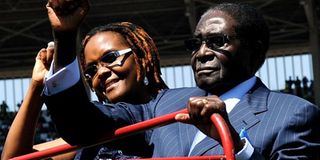Breaking News: At least 10 feared to have drowned in Makueni river
Robert Mugabe to become AU’s new chairman

Zimbabwean President Robert Mugabe, accompanied by wife Grace, greets the crowd at a rally on August 22, 2013. FILE PHOTO | ALEXANDER JOE |
What you need to know:
- Civil rights groups are worried as to the image it will give to the African Union.
- This will send mixed signals and an extremely awkward message, says observer.
HARARE
African leaders are expected on Friday to elect Zimbabwe’s President Robert Mugabe to the 54-member African Union’s rotating chair, a choice critics say risks tarnishing the organisation’s reputation.
Mr Mugabe, who at age 90 is Africa’s oldest leader, is widely expected to be anointed as successor to Mauritania’s President Mohamed Ould Abdel Aziz at the start of the two-day AU summit meeting in the Ethiopian capital.
But the veteran president has a different reputation outside the continent, and is subject to travel bans from both the United States and European Union, in place since 2002 in protest at political violence and intimidation.
Mr Mugabe, a former guerrilla leader who has ruled Zimbabwe since independence in 1980, is accused of crushing opponents to ensure his ZANU-PF party won every election for more than three decades.
Last year Mr Mugabe boycotted an EU-Africa Summit in Brussels after he was given a rare invitation — but his wife was still denied a visa.
But several African diplomats are also uneasy.
“It’s not a very encouraging sign,” sighed one African diplomat, who asked not to be identified. “The Mugabe style belongs to a past generation, the one that takes power hostage, and this is no longer the AU creed.”
AU Commission chief Nkosazana Dlamini-Zuma — who heads the executive branch that directs day-to-day work — launched the summit earlier this week highlighting “democracy, good governance and human rights” as core goals of the bloc. But her deputy Erastus Mwencha, has defended the right to choose any leader.
“Who am I to say to the people, you have elected the wrong leader?” Mr Mwencha said.
“The people have chosen: the important thing is that you must follow the constitution of your country.” Although the post of AU chair is largely symbolic, civil rights groups are worried as to the image it will give to the organisation.
“This will send mixed signals and an extremely awkward message on international levels on how the AU stands on principles of democracy and good governance,” said Jeggan Gey-Johnson, spokesman of the pan-African civil society coalition, The AU We Want.
President Mugabe who turns 91 next month is returning to international prominence after a decade of isolation over alleged isolation for alleged human rights violations and electoral fraud.
BY KITSEPILE NYATHI and Agencies





